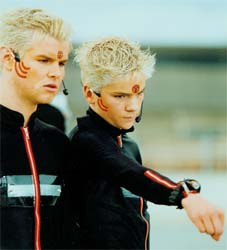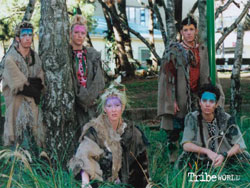 The big B.O., that dreaded word…at some stage in our lives we have all been aware of that clammy feeling under the armpits that means – duh duh duh – we are sweating. The big B.O., that dreaded word…at some stage in our lives we have all been aware of that clammy feeling under the armpits that means – duh duh duh – we are sweating. Everyone sweats (or nearly everyone anyway, we’ll explain more about that later) and sometimes the odour released, smells a bit more than at other times. Some of us call it perspiration, others ‘glowing’ but it is al the same thing – sweat… Our body needs to stay at a certain temperature – round about 36.5æC (or 98.6æF). Every day our bodies burn up around 2,500 calories to fuel the body. The process of burning the calories is called oxidation and it is powerful enough to boil water! Our blood gets pretty hot then the sweat kicks in to release the heat. The sweat beads that form on our skin quickly evaporate and cools the body down. On a hot day, we sweat more as our bodies cope with the additional warmth and we use fans or air conditioners to help evaporate the sweat beads from our skin and therefore cool us down. There are two types of sweat glands in the human body – the eccrine and apocrine glands. They are both long, coiled tubes of cells. Eccrine glands – the most common of the two glands, the eccrines can be found on the soles of the feet, the palms of the hand and on the forehead. These glands are small and do not produce any proteins or fatty acids.
The sweat glands are controlled by the sympathetic nervous system and that is why we tend to sweat more when we are nervous, scared or excited. And of course we sweat a whole lot more when we have been working out or running around. Getting rid of the smell The actual smell of body odour is due to bacteria that live on our skin. If sweat collects, the bacteria start to grow in it and it is these bacteria combined with our warm sweat that causes the smell. So if we wash frequently and change our clothes then the bacteria has nothing to react with and the smell is literally washed away. Deodorants and antiperspirants will also help with the smell. Deodorants actually help control the smell but won’t stop the sweat whereas antiperspirants block the pores under the armpits and help the sweat from escaping. There is some research to suggest that using antiperspirants too often can be harmful to your body (obviously the sweat needs to escape to help cool your body down) so if you have a sweat problem, the best thing to do is to see your doctor or health care provider to have a chat about the different options. Sweaty Betty
Other elements that affect the way in which we sweat – or rather don’t sweat – include: – third degree burns, certain types of drugs, infections, dehydration or heatstroke and Autonomic neuropathy (a condition that damages the nerves that control the sweat glands). ** If you suffer from sudden severe cold sweats, night sweats or do not sweat at all, please seek medical advice immediately ** But certain foods can make our sweat smell worse – garlic, chilies, onions, meat, spices, caffeine and alcohol. Fried and baked foods can give off a fatty rancid smell that is pretty disgusting and some people who eat a lot of fish, eggs and leafy vegetables find they actually smell of fish – this is because their bodies cannot metabolize the choline in the food they are eating. Tobacco is one of the main causes of bad smells – it actually seeps out through your skin pores and sweat glands. If you stop smoking, it can take several weeks for the smell to stop oozing out of your body! If you have really bad B.O., try to change your diet for a couple of weeks and see if this helps at all.
The Mall Rats ate a lot of tinned food when they found the Mall. All those baked beans – phew! Maybe that’s why the girls wore corsets so their underarms could breathe? The Eco Tribe or Gaians would have eaten a lot of veggies and their covered up bodies might well have been on the stinky side. And as for Pride and all that Lycra he wore? Hope he washed it out regularly. Some herbal remedies would have helped the tribes when they ran out of deodorants and antiperspirants – Witch hazel – wiping underarms with witch hazel is meant to be an effective way to get rid of stinky smells. Apple cider vinegar – this reduces the pH level of your skin and with a low pH level, bacteria cannot thrive so bang goes the smell! White vinegar – once the smell of vinegar has worn off, you should be smell free all day! Baking soda or cornstarch – Put on armpits, the starch dries up the sweat and kills bacteria. Sage Tea – is meant to reduce sweat gland function Rosemary – a natural antibacterial, rosemary kills the bacteria on the skin Turnip juice – rubbed on the armpits, turnip juice will keep the wearer smell free for up to 10 hours!
Join us soon for another Worldview. |


 Apocrine glands – these glands are found under the armpits in particular and in other areas of your body such as the anus. These glands produce the carbohydrates and proteins that result in those yellow patches you might find on your shirts. During puberty, the glands kick in and become active for the first time and that is why a lot of teenagers tend to be on the sweaty side.
Apocrine glands – these glands are found under the armpits in particular and in other areas of your body such as the anus. These glands produce the carbohydrates and proteins that result in those yellow patches you might find on your shirts. During puberty, the glands kick in and become active for the first time and that is why a lot of teenagers tend to be on the sweaty side. No Sweat On Me
No Sweat On Me Tribal smells
Tribal smells